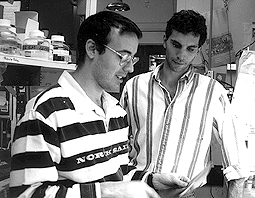
 |
A Taking part in the discussions were postdocs Riccardo Alessandro, Ph.D., Susan E. Clare, M.D., Ph.D., Marta Corcoran, Ph.D., and Greg Michelotti, Ph.D., all from NCI's Laboratory of Pathology, and clinical associates Mark Cowan, M.D., Naomi O'Grady, M.D., David Russian, M.D., Tony Slonim, M.D., and Bill Vandivier, M.D., all from the Clinical Center's Critical Care Medicine Department.
How would you rate the quality of training you have received at NIH? Do you think your experience is the exception or the rule?
Alessandro: I can't say that my [rewarding] three years as a postdoc are the rule at NIH since I have known people who have had quite bad experiences in other labs. I believe that about two-thirds of postdocs are satisfied with their training.
Michelotti: I would rate my quality of training very high, simply because our lab head is a tremendous scientist. Unfortunately, I feel that this is the exception rather than the rule, as there are many tenured scientists who are not as qualified to head a lab, much less train young scientists. I refer to them as dead wood.
Russian: On the clinical side, I think it's well known that you see a very unusual patient population here. Although it's challenging, sometimes I worry that it's not going to be the optimal preparation for working out in the real world, even the real academic world. But I think everyone knows that coming in, and that's sort of the downside of having that freedom to do research later on-knowing that you're going to be in a hospital that has an unusual, but somewhat limited, patient population.
Cowan: I'm the optimist of our class. I'm pleased with our clinical experience here. I think the point about the Clinical Center patient population being a little bit skewed and it not being the most rounded experience is true. But I think the program is set up to make up for those deficits. We spend the majority of our time at the Clinical Center, but we also rotate at neighboring institutions. During our first year, I spent a couple months at Navy [Bethesda Naval Hospital], a couple months at the Washington Hospital Center, and [some time] at Children's Hospital.
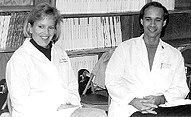 |
Slonim: I've only been here four months, but ... there are two key concepts that I've gotten here at the Clinical Center. One of them is the importance of having a command of procedural skills-and we have more training than we could ever want when it comes to procedural skills. ... The second thing is the value of being [part of] a multidisciplinary team ... when you go out to other institutions, it becomes really evident that there is something to that concept. ... When you have only physicians going on rounds, I think you miss out on a lot of the issues that surround that patient. And that point really struck home when I came back [from an outside rotation] to the Clinical Center.
What steps could administrators take to enhance the training experience at NIH?
Michelotti: Postdocs are here to do experiments and be sufficiently productive to land a good job. We can't be as productive when we must wait too long for standard reagents. I say give labs (or a subset thereof) standard purchase orders at certain key biotech companies from which a lot of ordering is done.
Alessandro: I think that something could be done to help postdocs get jobs after they leave NIH. A data bank of c.v.s that companies and academic institutions can access through the Internet would be something easy to start with.
O'Grady: One thing would be to really concentrate on the fundamental issue of bringing patients into the Clinical Center, whether it be for clinical studies or patient care or both. Clinical associates need to see patients.
Vandivier: And for our group [Critical Care], those patients need to be inpatients. A lot of studies are going to outpatient. It seems less emphasis has been placed on inpatient protocols, which leaves the hospital half empty.
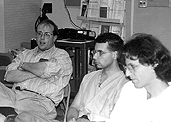 |
Vandivier: Another thing is that our travel budget is horrible. We basically have enough money to go to one meeting a year and that's it. If we have to go to a meeting where expenses are higher, we end up paying for it ourselves. Going to meetings is really important
Cowan: I may be a little naive about budgetary things, but it seems ... sending me to another meeting would be a drop in the bucket.
How important is mentorship to the development of a young scientist? What could be done to improve the quality of mentorship throughout NIH?
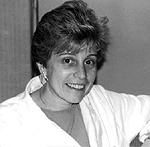 |
Clare: My guess is that whether your boss is a good mentor or not is a matter of the luck of the draw. I am most fortunate that my boss is committed to having us meet people in our field and to present our results as often as is appropriate.
Corcoran: I believe that mentorship is crucial for the development of a scientist. Maybe the quality of mentorship can be improved by making all principal investigators take mandatory classes to teach the basic qualities of being a mentor and how to troubleshoot certain situations. A quarterly evaluation should be made by the postdoc and the mentor, not only to enhance communication, but also to improve the progress of the research project.
O'Grady: I would rate my mentorship as excellent thus far.
Russian: I would second that.
Cowan: Jim Shelhamer is my mentor, and most of the time he's in his office, which is right next to my bench. We work closely together and have a wonderful relationship.
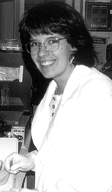 |
Michelotti: Crappy. I've already decided to apply to med school because the prospect for funding in the future is bleak at best.
Clare: The current job market for Ph.D.s, from what I have read and observed, is very tight. I envision myself in an academic medical center with a limited surgical practice and with a lab 10 years from now.
Alessandro: The job market is tough and competitive. I hope to get a permanent position in Italy and come back quite often to the U.S. to keep myself up to date on the latest techniques and scientific developments.
Corcoran: NIH postdocs don't receive formal training in teaching, which is often needed for a job in academia. The experience we get at NIH is not industrial-based and, therefore, not appealing to industry. Although I lack industrial experience, I probably see myself working for industry at some point in the next 10 years. NIH administrators can help lessen postdoc anxieties by ... creating programs that allow postdocs to stay longer than five years. In the current climate that grants few tenured positions at [NIH], postdocs are unable to realistically compete with older and more experienced scientists.
Vandivier: There have been a number of fellows who recently completed training here. They all spent a lot of time trying to find good academic jobs, and it was very hard. ... and once you get to that job, your prospects for getting a grant are horrible.
O'Grady: The job prospects for academic positions are bad right now and may get a little worse before we get out of here. I think that's probably a universal concern.
Cowan: Granted, we [M.D.s] are better off than the Ph.D.s in a sense that if the academic situation continues to be bad and get worse, I know that I can get a job taking care of patients and make enough money. ... I get job offers in the mail every day. So that's a secure feeling.
Vandivier: It's true that we [M.D.s] have that [private practice] to fall back on, but I don't think anybody who's come here really wants to do that unless they have to. That brings up another point ... I think that the time that is allowed for the research part of this clinical fellowship should be lengthened. The reason I say this is because many M.D.s come to NIH with a lower baseline of knowledge and ability to do research, especially bench research, than Ph.D.s. So, we end up spending a lot of time relearning things we have left behind 10 years ago to do medical training. On top of that, many of us get double board certification [which requires another clinical year]. So, you may not end up taking the risk to venture into a more complex research project because you just don't have the time to do it.